Useful Information
Pilgrims of Hope: Spiritual Development and Action of Gen Z
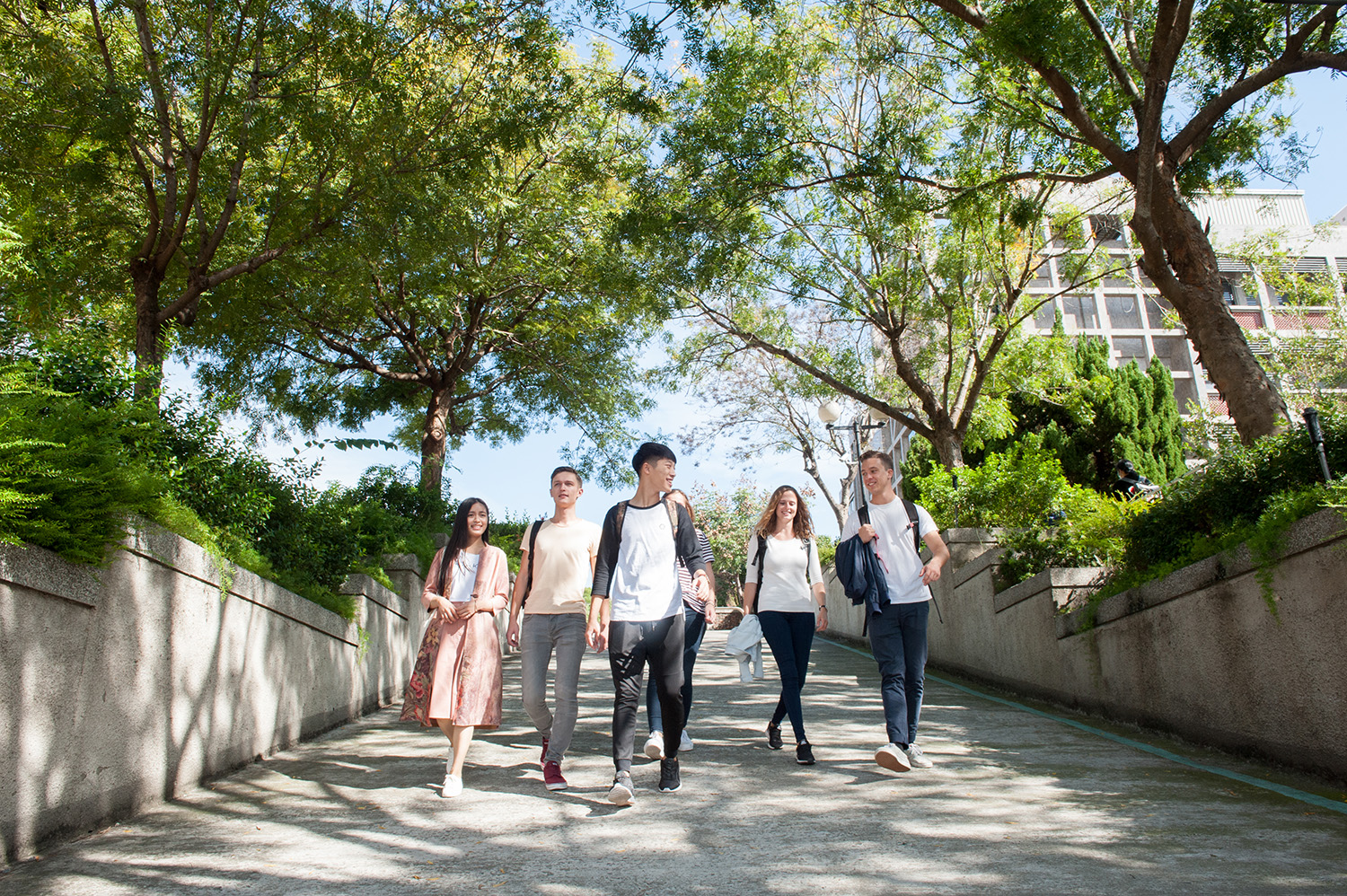
- 1. Registration
- 2. Timetable for ASEACCU 2025
- 3. Registration fee payment
- 4. Hotel Information
- 5. Airport Arrivals
- 6. Contact Detail
- 7. Requirements for Visa/ETA Application
- 8. Certificate
- 9. Conference Kit
1 – Registration period
- Registration is open now until July 21, 2025
- Registration should only made via the ASEACCU Conference 2025 Website
Please check if you would need a visa to enter Taiwan and prepare timely: https://www.boca.gov.tw/np-137-2.html
2 – Registration Fee
A. Register by May 20, 2025 (includes accommodation and shuttle service)
- Faculty and staff conference USD 650
- Student conference USD 450
B. All registrations between May 21, 2025 and July 21, 2025 will be exclusive of accommodation and shuttle service.
- Faculty and staff conference USD 450
- Student conference USD 350
Registration fee includes all as follows:
- Transportation to and from Attractions
- Meals ( AM Snacks, Lunch, most PM Snacks, Dinner)
- Hotel Accommodation for the program duration (if registered by May 20, 2025):
- Student conference: Accommodation from Monday 18th August to Friday 22nd August 2025, 4 nights with breakfast.
- Faculty and Staff conference: Accommodation from Monday 18th August to Thursday 21st August 2025, 3 nights with breakfast.
- For faculty or staff members who wish to extend their stay or make their own arrangements, the fee will be ranging from USD100 to USD110per night; and for students, the fee will range from USD115 to USD120 per night.
- Conference Kit
3 – Registration Policy
Once booked, registration fee is non-refundable.
- Registration Period: now until July 21, 2025
- Conference Duration: August 18-21, 2025
ASEACCU 2025 payment
- The registration fee must be paid either by credit card or bank transfer. Please follow the instructions in the payment portal.
- The registration fee payment deadline for both conferences is on 21st July, 2025. Registration is not confirmed until payment has been received.
Bank Transfer Information
Member institutions can pay the ASEACCU Conference in USD through the following account:
Account Name: Universidade de São José
Bank Name: Banco Nacional Ultramarino
Account Number: 9006835049
Bank address: Avenida Almeida Ribeiro, No. 22, Macau (China)
Swift Code: BNULMOMX
IBAN: N/A (in Asia)
Important: Please cover the Bank charges and the wire transfer fee your Bank may charge.
Housing Arrangement:
- Faculty and staff members: Accommodation is provided for 3 nights (August 18, 19, and 20). Single rooms will be arranged.
- Students: Accommodation is provided for 4 nights (August 18, 19, 20, and 21). Shared rooms will be arranged.
For additional nights, the cost per room will be:
- Faculty and staff members: approx USD 100 to USD 110 per night
- Students: approx USD 115 to USD 120 per night
Please note rooms are subject to availability and accommodation at other locations may be required. If you wish to extend your stay at our conference accommodations outside of the above dates, you may book directly through their websites below.
Please contact the PU team should you need further assistance.
- Ms. Jinny Yeh: chjhenn01@pu.edu.tw
- Mr. William Hsu: william814@pu.edu.tw
Hotel Information
*Please note that late accommodation arrangement requests for Faculty & Staff delegates will be arranged at the Taichung Harbour Hotel.
| Faculty/
Student |
Hotel | PU-Hotel/Distance (Km) | Website |
| Faculty | 台中福華大飯店
(Prince Hotel Taichung) |
5.5 | Visit > |
| Student | 台中港酒店
(Taichung Harbor Hotel) |
10.3 |
Visit > |
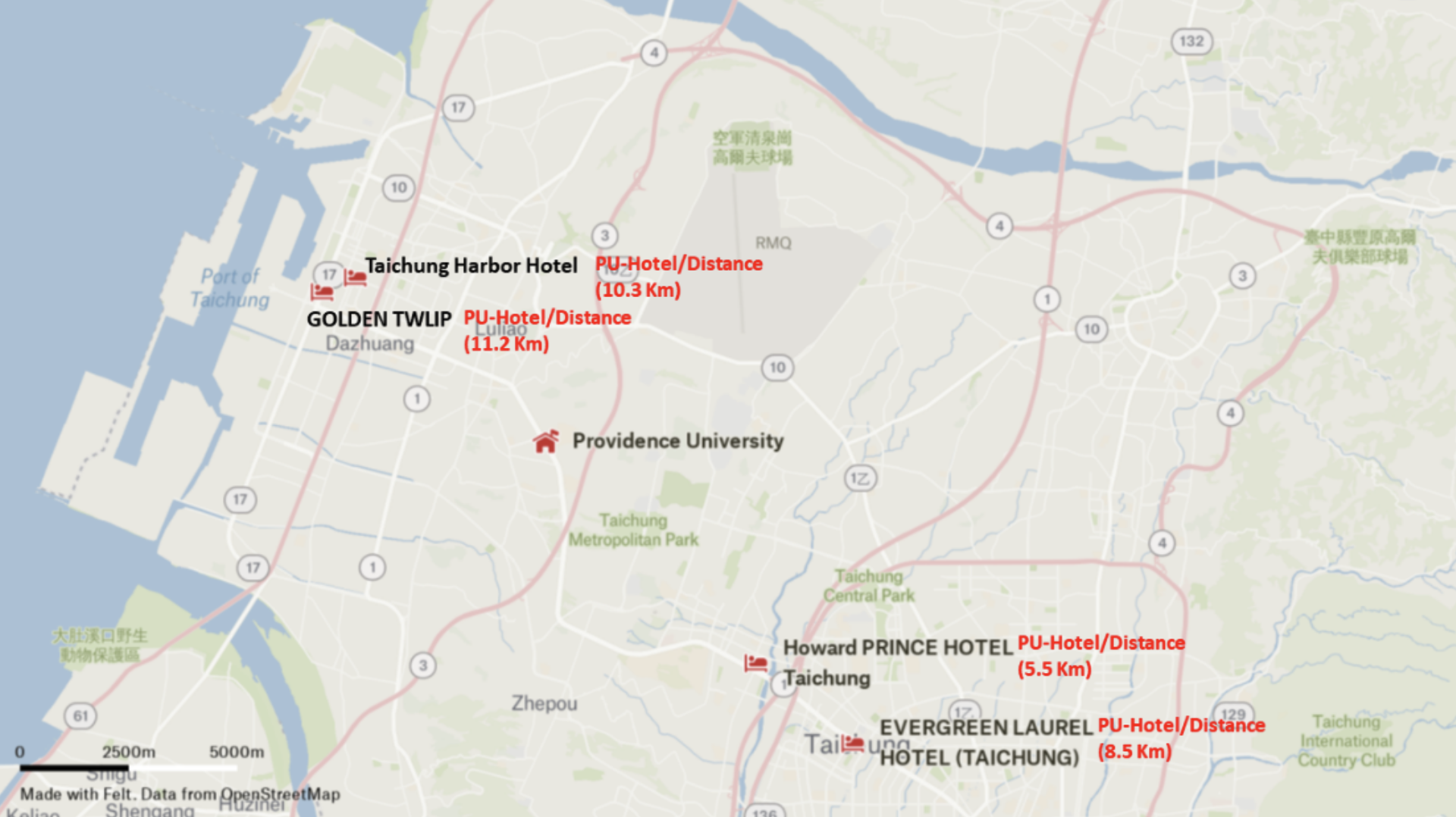
PU will have an arrival desk at Taoyuan International Airport on Monday 18th August 2025 from 7am – 3pm.
If you are not able to make it in time for the airport pick-up time, kindly follow the travel instruction below:
- Taoyuan International Airport ←→ HSR Taoyuan station (20 mins)
- HSR Taoyuan station ←→ HSR Taichung station (40 mins)
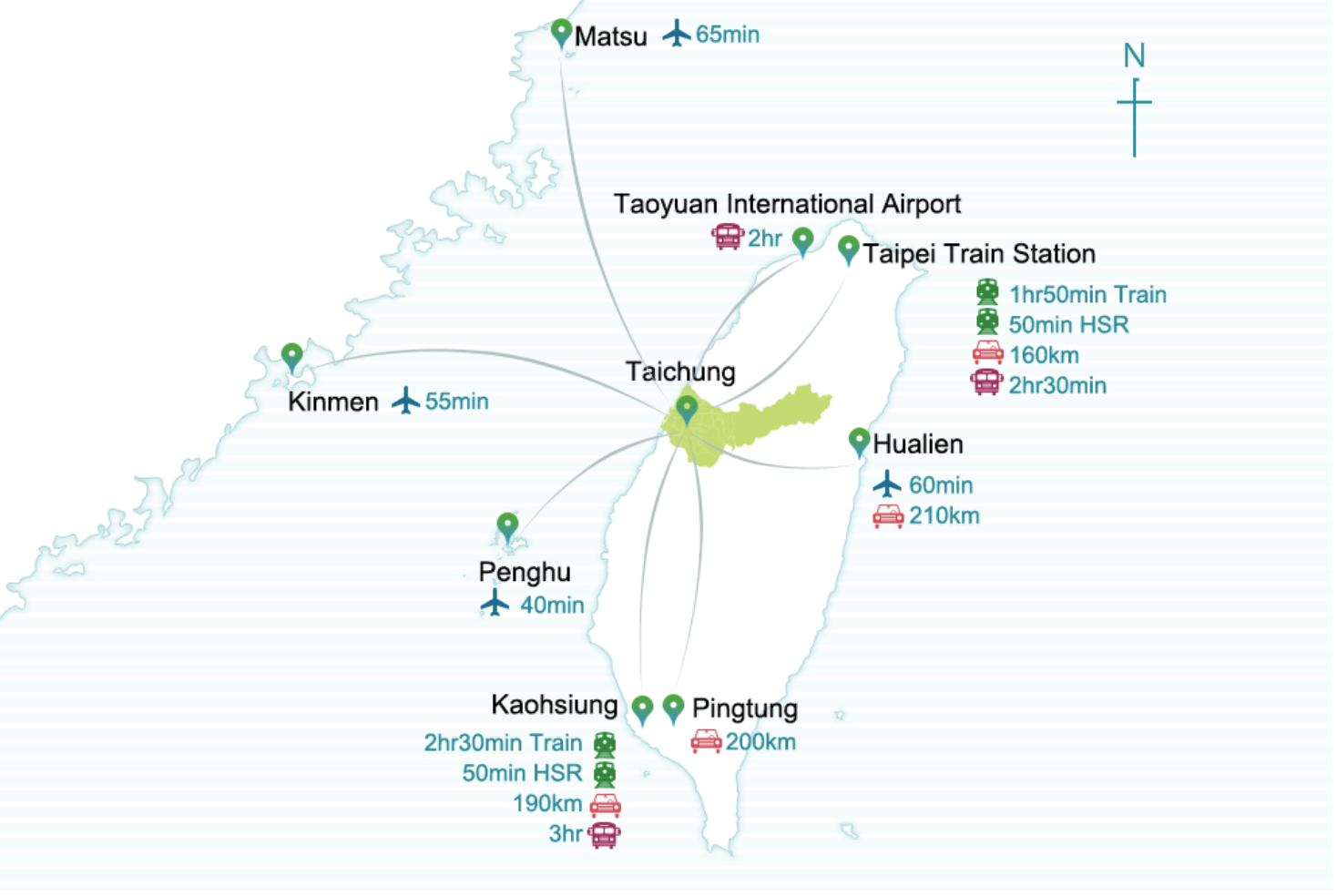
PU together with the ASEACCU Secretariat will be creating a Group Chat for all participants for easy communication on general information.
This information will be sent to all participants in the week leading up to the conference.
For direct and formal communication, you may reach the PU team through email.
Ms. Jinny Yeh: chjhenn01@pu.edu.tw
Mr. William Hsu: william814@pu.edu.tw
Visa requirements may vary from one country of origin to another. Please click this link and type in your country of origin to read specific information and guidelines. https://www.boca.gov.tw/np-137-2.html
There are 4 types of visa for foreign visitors:
- VISITOR VISA: Short-term visa, stay of duration must be in 180days
- RESIDENT VISA: Long-term visa, stay of duration must be over 180days
- DIPLOMATIC VISA
- COURTESY VISA
To reduce conference costs, environmental impact and ensure a seamless and efficient experience for all conference attendees and the organizers, an authorized e-certificate will be sent to you through the email you inputted during your registration process, immediately after the conference.
Student and staff/faculty participants will receive:
-
- ID/Name badge
- Lanyard
- T-Shirt
- Conference bag
- Notebook
- Pen
- Drink bottle
- 10. Guest Speaker
- 11. Cultural visits
- 12. Things to See and Do in Taichung
- 13. Local Transportation
- 14. Liturgy
- 15. Currency
- 17. Electricity
- 18. Weather and Clothing
- 19. Drinking Water
- 20. Emergency Protocol
Detailed information about the guest speakers in the conference program will be updated on the Conference website.
The conference has arranged visits related to “Sustainable Development Tour” or “Cultural Heritage Pilgrimage”
Pilgrimage or Eco-Tour: Groups will be formed based on the number of participants (separate groups for teachers and students).
Multiple routes will be designed, such as sustainable development tours and Taichung cultural tours, etc.
Travel to and from these sites will be pre-arranged.
Delegates will also visit the Gao-Mei Wetlands.
Gao-Mei Wetlands (Birdwatching, water play and sunset seeing)
The Gaomei Wetlands are located on the south side of the Dajia River Estuary in Qingshui. Over 120 bird species have been recorded here, it is an important ecological conservation area. It is not large, but because it has both mud flats and sand beaches and is also connected to the estuary’s swamp area, it contains a rich variety of flora and fauna.
It also offers beautiful sunsets over a unique manmade landscape, Gaomei Lighthouse, and wind turbines. A cycle track runs through the area on which riders may coast with the wind in their hair, the Gaomei Wetlands are one of the highlights of the shore.
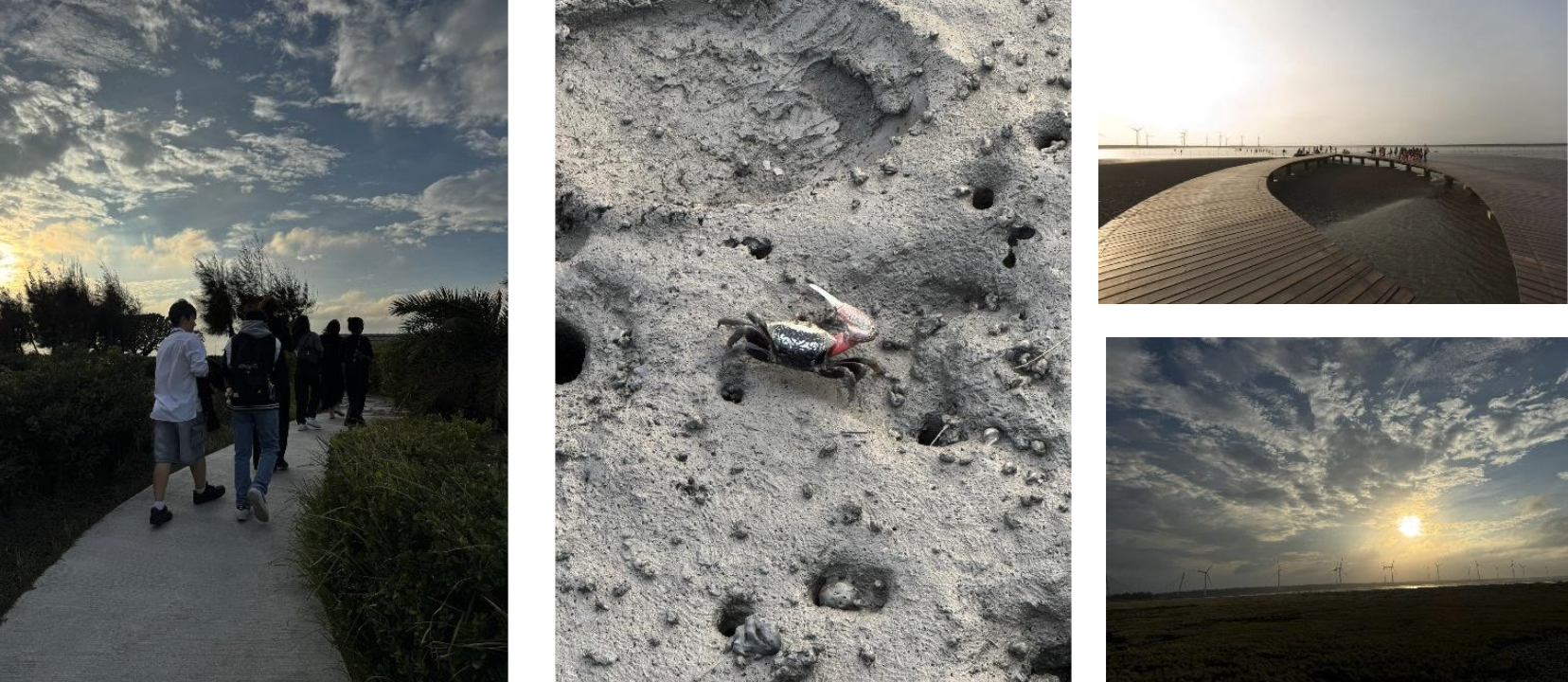
The beauty of a city does not come from nowhere or simply lies on the surface; it is deeply rooted in the soil, and then blossoms vigorously.
The attractiveness of Taichung originates in its abundant ecosystems, the ancient glamour of history, and incredible arts and literature.
While endeavoring to achieve modernization as well as remember the past, Taichung strives to meet the international standards to be globally well-known as well.
Visit https://travel.taichung.gov.tw/ for travel information.
Download the Fun in Taichung app: https://apps.apple.com/mo/app/fun-in-taichung/id796773334?l=en-GB
Check out the following attractions:
- Transportation fees for the ‘official trips’ included in the conference program are covered in your conference registration fee.
- Should you wish to take additional trips around the city on your own, head to the link below for timetables and pricing: https://travel.taichung.gov.tw/zh-tw
Download “Fun in Taichung” APP to get access to sightseeing spots, savory cuisines, accommodations, and transportation information in Taichung City. In addition, the APP also provides multiple interactive services, assisting in itinerary planning in advance and all kinds of enquiries you might need on the go!
“Fun in Taichung” is absolutely your good helper while you’re traveling in Taichung.
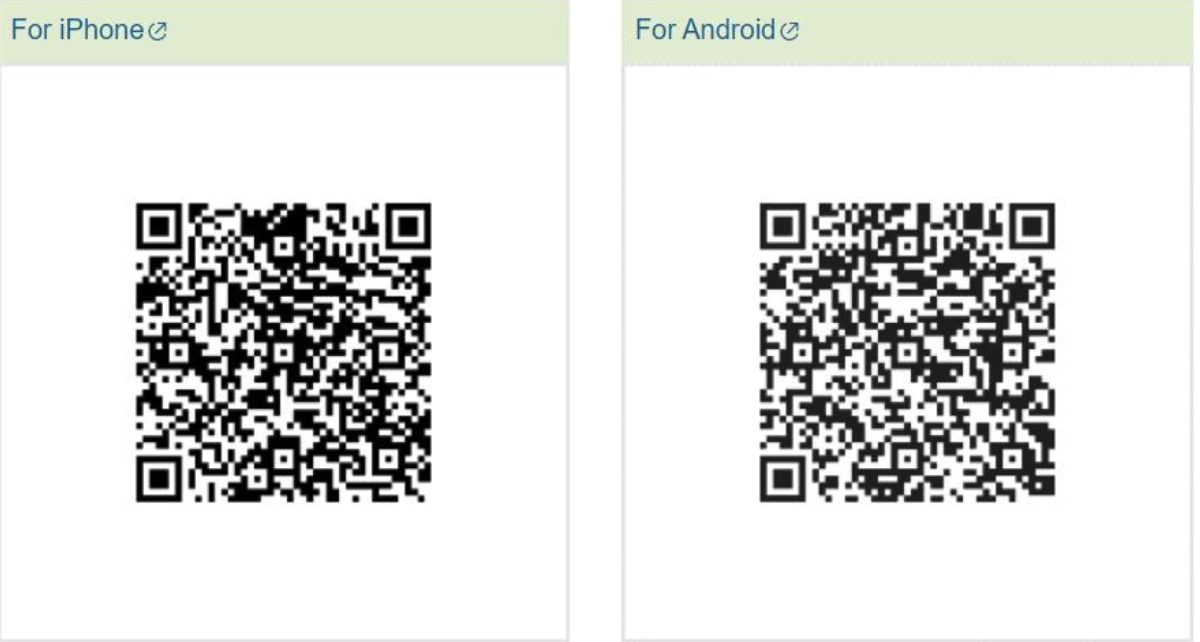
For the masses during the conference, kindly refer to the 2025 ASEACCU Programme.
The New Taiwan Dollar (TWD) is the official currency of Taiwan.
For the daily foreign exchange rate visit: https://rate.bot.com.tw/xrt?Lang=en-US
Foreign currency can be exchanged at government-designated banks or international tourist hotels. Be sure to keep the receipt obtained during the exchange. If you need to convert unused New Taiwan Dollars back before leaving, you must present this receipt.
The standard voltage in Taiwan is 110V, and the frequency is 60Hz. There are two types of plugs: type A with two flat pins, and type B with three-pin plug (two flat pins plus a round grounding pin), commonly used for laptops or medium to large appliances. Two flat pin plugs also fit into three-pin sockets. When traveling to Taiwan, be sure to bring a power plug adapter or voltage converter.

In August, Taichung tends to experience very high temperatures and heavy rainfall. August is a notable month of the summer season. Expect the temperatures during the day to hover around 31°C. At night, they will likely drop to about 24°C. Although these are average temperatures, some days can be hotter. Wear cool, breathable clothing and protect yourself from the sun.
Generally, tap water is not consumed in Taichung and it is recommended that the public boil tap water before drinking.
There are usually hot and cold water dispensers available at the Conference venues for everyone to use. With PU’s commitment to sustainability it is recommended that you use and refill your conference drink bottle, or personal drink bottle, throughout your time in Taiwan, rather than purchasing bottled water.
In the event that an earthquake occurs:
- Prepare an “emergency evacuation kit” and place it in an easily accessible location.
- During an earthquake, stay calm and ensure your safety, especially being mindful of falling objects.
- When the shaking is intense, first take cover under a sturdy table or next to a main pillar.
- Do not take cover under light fixtures, near cabinets, or by the refrigerator during an earthquake.
- Immediately turn off any fire sources in use.
- Do not use elevators.
- Move to an open area immediately and stay away from signs, trees, buildings, and utility poles.
- If you are driving during an earthquake, do not brake suddenly or change lanes. Instead, slow down and pull over to the side of the road.
- If you are in a public place, stay calm, follow broadcast instructions, and do not panic or push.
- If you are in a large venue like a stadium, auditorium, or theater, first take cover under your seat and wait until the shaking stops before leaving.
- After the earthquake, check the gas, water, and electrical switches. If there is a gas leak, gently open a window, leave the building immediately, and notify the gas company.
- Always listen to accurate earthquake information from TV or radio and do not believe rumors.
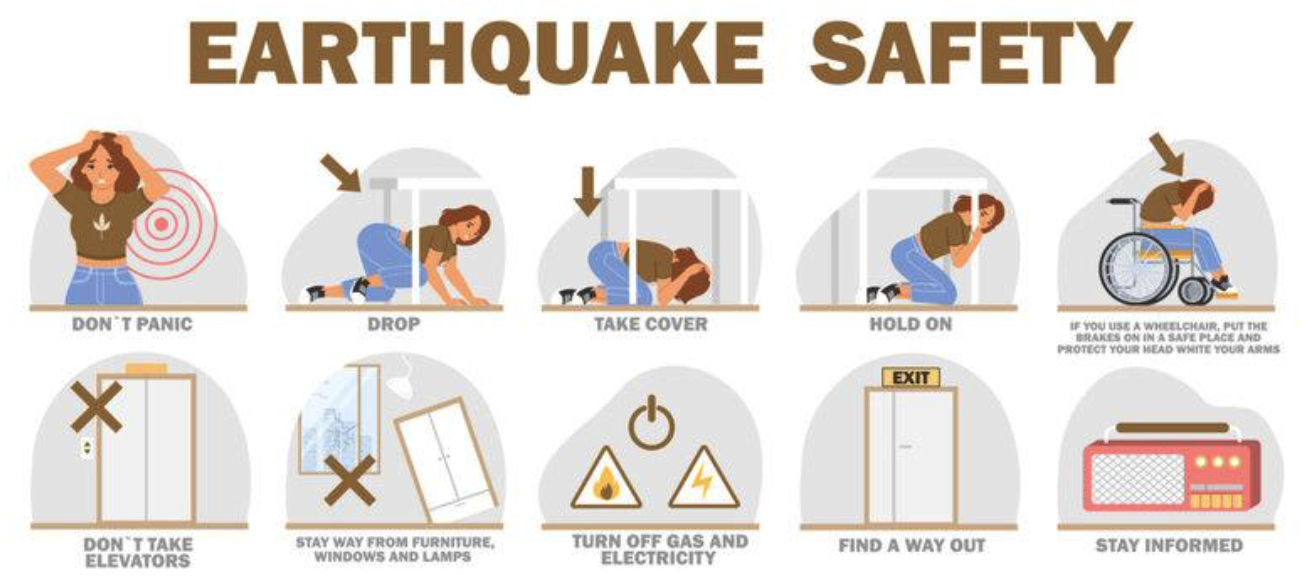
Typhoons
Typhoons are most likely to hit Taiwan from July to October. Should you encounter heavy rainfall, here are some tips:
- Stay safe indoors: It is recommended to remain inside and avoid unnecessary travel, especially to coastal or mountainous areas.
- Monitor weather updates: Keep an eye on local weather reports for any typhoon warnings or updates.
- Don’t panic: Typhoons are common in Taiwan, and most buildings are well-equipped to handle them. Just stay informed and follow local advice.
All program and arrangement preparation will be updated and adjusted depending on health and weather protocols and availability of guest speakers.
The ASEACCU’s Steering Committee and PU as host institution, would like to reserve the right to alter the details of the program depending on time constraint and condition.
